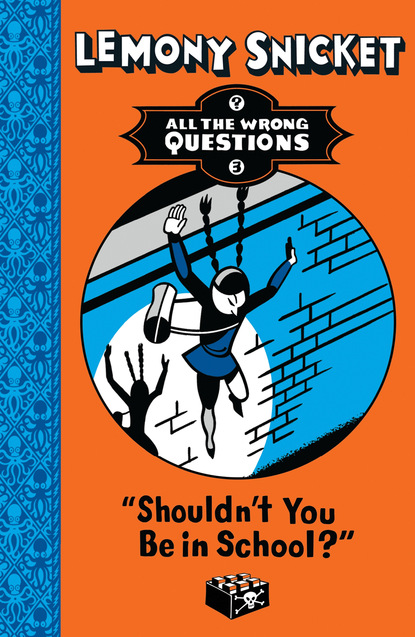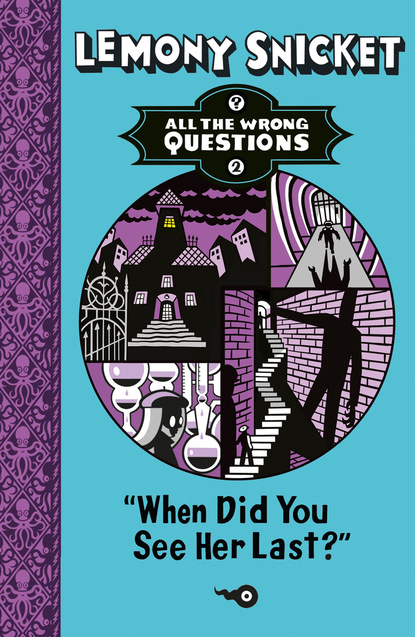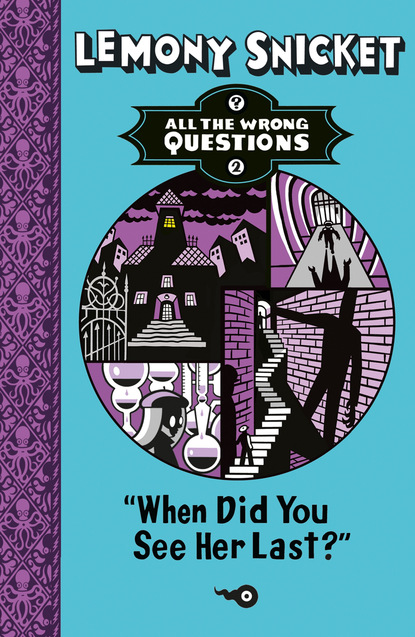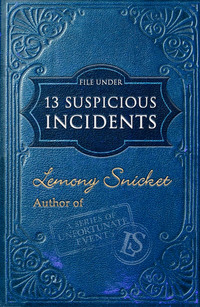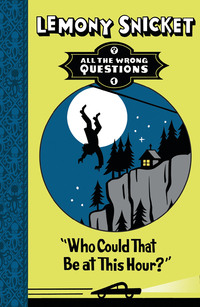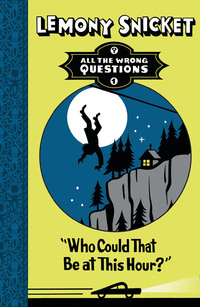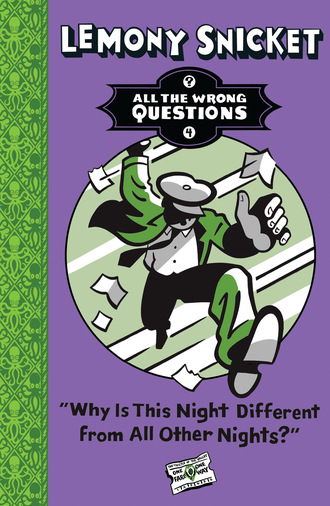
Полная версия
Why Is This Night Different from All Other Nights?
Somewhere, I thought, is the car where they lock all of Stain’d-by-the-Sea’s prisoners on their journey into the city. Somewhere there is Dashiell Qwerty and somewhere there is Ellington Feint, but you don’t see them, do you, Snicket? You can’t even find S. Theodora Markson, and you were supposed to be following her. With the black aprons, the blue jackets, and the gray suits, you don’t even know what uniform to look for.
I found a ticket booth where a woman sat behind a window, reading a book I didn’t like. I didn’t like the woman either. She was wearing an unfortunate smock with a little rip near the shoulder, right near a name tag printed with her name. I didn’t need it. I remembered her well enough.
“Polly Partial,” I said, and the owner of Partial Foods looked up and frowned at me.
“Total Stranger,” she greeted me in return.
“We’ve met a number of times,” I said, remembering that Ms. Partial had never been a reliable witness. “Why are you working here, instead of at your grocery store?”
“I have no more grocery store,” she said sourly. “The place was closed due to lack of interest. Some thieves took all my honeydew melons, which really affected employee spirit.”
“Well, at least your new job gives you time to read,” I said, pointing at the book. “How are you enjoying that?”
“Not so well,” she said.
“I’ve never liked that book.”
“Oh, I think the book is very good,” she said. “It’s just that I was interrupted while I was reading it by some boy who keeps asking me questions.”
“I’m sorry,” I said, and I was a liar. “Is there room for one more passenger on that train?”
“The Thistle of the Valley ?”
“Is that what the train is called?”
“Yes.”
“When does it leave? Where does it stop?”
Polly Partial handed me a piece of paper printed on all sides with confusing times and locations. It looked like a herd of numbers having a square dance. I would rather have reread her book than Stain’d-by-the-Sea’s confusing train schedule, but just barely. “I can’t make head nor tail of this,” I said.
She pointed to one of the squares on one of the charts. “The Thistle of the Valley leaves in two minutes from Track One,” she said. “It winds through town, with brief stops at the post office, the museum, the library, and various downtown businesses, including Partial Foods and Ink Inc.”
“Those places scarcely exist in this town anymore,” I said.
“As you can see,” she said, pointing to different squares, “all those stops have been canceled indefinitely.”
“So then why did you mention them?” I asked her.
“It’s standard policy,” Polly Partial said, using a phrase which never means anything. “Unless there are special requests, The Thistle of the Valley makes no scheduled stops in town but travels across the sea and finally reaches the city before continuing on to various villages and tourist attractions.”
“The sea doesn’t exist anymore either,” I reminded her. “There’s only Offshore Island, a few remaining inkwells, and the Clusterous Forest.”
“Don’t tell me about the Clusterous Forest,” Polly Partial said. “That area used to provide my store with fresh fish, before it became empty and lawless.”
“I’m sorry about your business,” I said.
“So am I,” she replied, “but I’m not paid to listen to sympathetic comments. Do you want a ticket or not?”
“Yes, please,” I said. “If possible I’d like to sit close to the prison car.”
She blinked suspiciously at me. “We don’t tell passengers if there are prisoners on board a train,” she said. “That’s standard policy.”
“You don’t have to tell me,” I said. “I already know there are prisoners on board. I just want to sit close to them.”
“I can’t do that,” she said. “There are only two compartments per train car, and the rear compartments have all been reserved.”
“So the prison car is at the back of the train,” I said. “Thank you very much.”
Partial scowled and snatched back the schedule. “Do you want a ticket or not?”
“I don’t have any money,” I admitted.
“Then I suggest you scram and let me finish my book.”
My hand was in my pocket, and I could feel the message Ornette had left for me, crinkly in my hand. “I need to get on that train,” I said.
“No one gets aboard that train without a ticket identifying them as a passenger, or a thistle identifying them as an employee.”
I pointed to the rip on her smock. “Where’s your thistle?”
She quickly and badly tried to cover the rip with her hand. “A bird took it,” she said. “I mean, it fell off.”
“You’re not a very good liar,” I said.
“I never learned how,” she said. “The grocery business is mostly an honest one.”
“It can’t be standard policy to give away thistles,” I said. “Perhaps I should report you to the railway company.”
“They won’t believe a child, a pest, and a nuisance.”
I pointed at the book. “Give me a ticket or I’ll give away the ending.”
“You wouldn’t dare,” Polly Partial snarled. “Now scram. There’s no ticket for you here.”
“They find him guilty,” I said. “The lawyer does his best at the trial, but the town finds Tom guilty just the same.”
“You dirty rat,” she sputtered. “I only had a few chapters to go.”
I shrugged and walked away from the booth. I felt bad. It wasn’t Polly Partial’s fault that I didn’t have money for a ticket, so I didn’t really have a good reason to spoil the ending of the book. But I decided not to apologize for two reasons. The first was that I didn’t feel like it. And the second was that someone had spotted me, someone who was striding toward me with a scowl that I’m sure matched my own.
It is not difficult to describe Sharon Haines, because we’ve all seen the likes of her plenty of times. Bad mothers are like old newspapers. No one has need of them, but they’re everywhere, blowing around town. Sharon Haines was the mother of two children—a daughter named Lizzie, who had been kidnapped by Hangfire, and a son named Kellar, who had joined us to fight him. Sharon, on the other hand, had joined the Inhumane Society in a misguided effort to please the villain holding Lizzie captive. “Misguided” is a word which here means that it wasn’t going to work, but even with her treachery revealed she continued to stride toward young people, barking orders and questions.
“Come over here, Snicket!” she barked. “What are you doing at Stain’d Station?”
“Being a child, a pest, and a nuisance,” I said. “What are you doing here, Mrs Haines?”
“I might ask you the same thing,” she said haughtily.
“You already did,” I said, and she gave me another scowl, although her heart wasn’t in it. Her fingers fiddled nervously at her sides, one hand more nervously than the other, and her eyes were scanning the enormous room, back and forth like anxious pendulums. “I’m looking for someone too,” I told her. “Wouldn’t it be funny if we were both looking for the same person?”
Sharon gave me one more scowl and a gasp and then yet another scowl for good measure.
“Don’t worry,” I said. “We’re not. You’ve already found the person I’m looking for. That’s how you got your skeleton key back.”
Sharon’s hands raced to their pockets, but one pocket wasn’t big enough. The skeleton key stuck out like a feather in a bad hat. It would be an easy caper to steal it like that. “You’d better get it back to Hangfire,” I said. “I’m sure he has no idea you lent it to a friend.”
“I’ll thank you,” she said sternly, “to stop interfering.”
“Oh, you don’t have to thank me, Mrs Haines.”
“Get out of here, young man. You have no idea what is going on.”
“That’s why I’m here,” I said, but she gave me a little growl of frustration and stalked off. She came over to you, I told myself, and now she can’t wait to walk away. A rude buzzer was ringing from someplace, and the station grew louder and busier. There were calls of “All aboard!” from the conductors, and passengers raced past me like I was nothing but an obstacle. A young woman stepped on my toe without apologizing, and my elbow got walloped by a suitcase carried by a man I probably should have looked at. The train was leaving shortly, and I wasn’t on it. Think, Snicket. This is the train’s only scheduled stop in town, and your only chance. How can you make your way onto that train?
“We have to get on that train!” exclaimed a voice near me, and a tall woman hurried through the crowd, followed by a porter who looked about my height and about my age. But it was the woman I recognized. Sally Murphy was once Stain’d-by-the-Sea’s most celebrated actress and more recently had been among those who had fallen under the power of the Inhumane Society. Some time ago Ms. Murphy had put on a very convincing performance as the original owner of the statue of the Bombinating Beast, and at the moment appeared to be doing a very good imitation of someone very nervous.
“You,” she said, very nervously.
I stood in her way and wouldn’t budge. “Me,” I agreed.
“I suppose you want me to thank you for your actions when we saw each other last.”
“It is traditional to thank the person who rescues you from drowning in the basement of an abandoned mansion,” I agreed. “In fact, it might be said that you owe me a favor.”
She tried to step around me this way and that. “Maybe I can buy you an ice cream cone sometime,” she said quickly.
I kept on not budging. “That’s not what I want.”
“All children want ice cream.”
“What I want is to get aboard that train,” I told her.
“It’s a very popular night to leave town.”
“So I’ve noticed,” I said, watching Sharon Haines disappear into the crowd. “Can you tell me why you’re leaving?”
Sally Murphy took a quick look at her porter. “Please don’t ask me that.”
“If you’re doing more work for the Inhumane Society,” I said, “then you’ll need to explain yourself to the police.”
The actress looked wildly around her, like a field mouse in the shadow of a hawk. Even Sally Murphy’s porter looked a bit frightened. “Not so loud!” Sally hissed to me. “I’ll thank you to stop interfering.”
“Why does everyone keep wanting to thank me for the same thing?” I asked, but the porter stopped the actress from answering my question.
“We’d best be getting on, ma’am,” the porter said. “We don’t want to miss the train.”
“I don’t want to miss it,” Sally Murphy corrected, and I took a better look at the person she was speaking to. The porter had wide eyes and a mustache that quivered. It was a striking mustache, I noticed—so perfectly square that it looked more like a piece of paper. Of course, I thought, a person my age with a mustache was already striking. The porter’s hair was striking too, with hairpins poking out here and there all porcupiney, and the uniform was the right one—a bright blue jacket with a thistle on the lapel—but fit all wrong. Uniform, I thought. Disguise. But it certainly wasn’t my chaperone I was looking at. There weren’t enough hairpins in the world to tame the mane of S. Theodora Markson.
“Tell me,” I said to the actress, “are you helping Hangfire or escaping him?”
Sally Murphy looked down at me, and I saw one tear in her eye, slow and bright, looking down at me too. “I’ll never escape from Hangfire,” she said quietly, “but perhaps an actress can manage the most important performance of her life. Come now, porter.”
“Yes, ma’am,” the porter said, and then finally I budged. I budged to the left and Ms. Murphy and the porter budged over to where a conductor was standing. Ornette’s folded sculpture crinkled in my pocket again. A paper train, I thought. Sharon Haines. Sally Murphy. S. Theodora Markson. I knew there was a mystery here, but the mystery mystified me.
With a click!, the conductor punched the actress’s ticket, and Sally Murphy and the porter walked toward The Thistle of the Valley. “Excuse me,” I said to the conductor, quickly and desperately. “I need to get on that train, but I’m afraid I don’t have a ticket.”
“Then you’re out of luck,” the conductor said. “That’s standard policy.”
“Pretty please?” I asked, which never works, and sure enough the conductor shook his head.
“Another train will come along before too long, sonny boy,” he said.
“I need to be on tonight’s train,” said sonny boy.
“Why tonight?”
“I’m not sure,” I admitted, and he gave me the look adults give to children they call sonny boy. I frowned back at him, but it didn’t help. Sally Murphy disappeared into the train, and I watched her porter follow with the bags. He’s right, Snicket. The conductor is right. You’re out of luck.
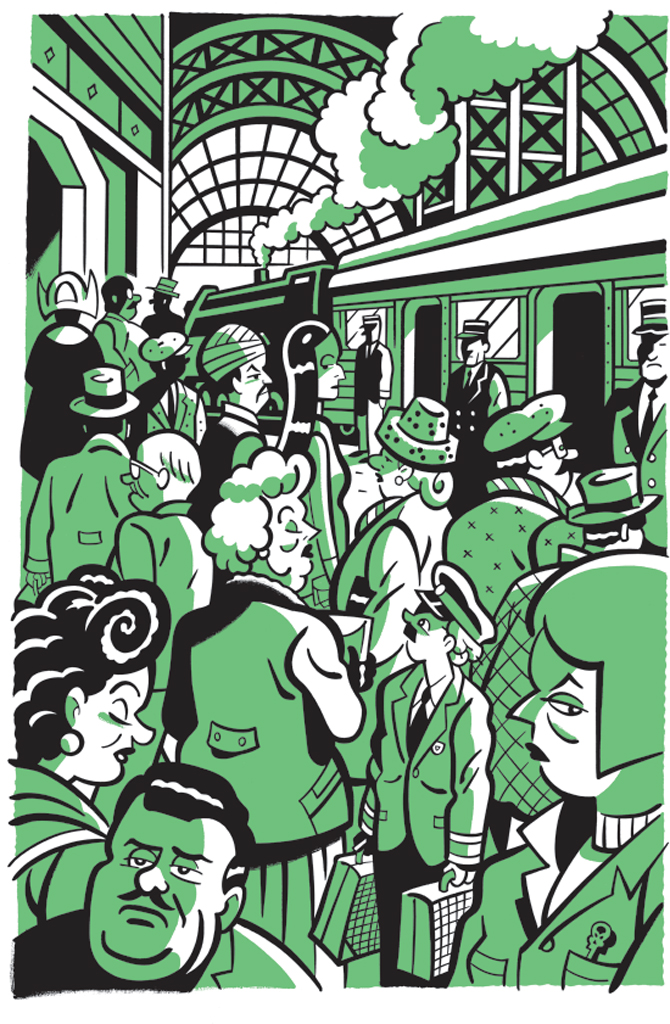
The buzzer buzzed again, and the conductors began to shut the doors of the train. The Thistle of the Valley blew its whistle, loud and bright like an adventure was starting. The heavy wheels began to move, a clackety racket that echoed everywhere, first slowly and then quicker and quicker. The engine grumbled its way out of view, then the tender and then the cargo cars, one by one, lonely without the ink that ought to have been in them. Next came the passenger cars, with silhouettes of passengers here and there in the windows, too quick and distant to recognize. I tried to recognize them anyway as they went past, actors or chaperones, friends or foes, strangers or people pretending to be strangers. But by now the train was moving too quickly for me to see anything more than a few pale faces behind the blank glass, as if The Thistle of the Valley were full of ghosts. I could see the last car approaching, and then I saw it pass, locked tight so the prisoners couldn’t escape, although it felt like they were escaping anyway, out of my sight and out of my reach. The last of the train left Stain’d Station like sand through my fingers, and I just stood there watching, helpless and useless. The mystery is leaving, Snicket. Your investigation is escaping, and now you’re all alone.
The station took a while to settle down, and I stood for a moment with my hands in my pockets, one clenching a paper train and the other clenching nothing. I didn’t want to give up, so I tried to guess what to do next. I guessed and then I kept guessing and then I couldn’t guess and then I gave up. Trudging out of the station, however, turned out to be the right guess after all, because a solution was stopped just at the curb, honking its horn and calling my name.
“Is that you, Snicket?”
I smiled. “Is that you, Pip and Squeak?”
The boy at the wheel smiled, and his brother crawled up from his position at the brake pedal so they could both hand me cards through the taxi’s open window. The cards told me what I already knew. Bouvard and Pecuchet Bellerophon, better known as Pip and Squeak, provided discreet transportation, a phrase which meant they drove the only taxi left in Stain’d-by-the-Sea whenever their father was sick or couldn’t do it for some other reason, which was almost all the time and always. They weren’t quite tall enough to drive by themselves, but with Pip steering and Squeak on the pedals, they’d gotten me out of a few tight spots after getting me into them more or less on time.
I hurried into the back of the cab. “I need you two on a tail job.”
“Neat,” Squeak said, in the voice that gave him his nickname. “Since we started driving this taxi, I’ve been waiting for someone to say ‘follow that car.’ ”
“It’s not a car I want you to follow,” I said. “It’s a train.”
“Follow a train?” Pip repeated with a laugh. “That’s hardly a tail job. It runs on tracks, doesn’t it? Why do we need to follow a train when we already know where it goes?”
“I need you to take me to where it goes before it gets there,” I said.
“So instead of ‘follow that car’ it’s ‘precede that train’?” Squeak asked, sliding down to his pedal spot. He sounded a little disappointed.
“I need to get onto The Thistle of the Valley,” I said, “but I couldn’t manage it here.”
Pip frowned. “But there’s nowhere else you can get on board. They canceled all the old stops in town.”
“That’s why I need you to take me to Partial Foods,” I said. “The back entrance, off the alley, where the train tracks are.”
“Didn’t you hear us, Snicket?” Pip asked. “The Thistle of the Valley doesn’t stop there or anyplace else.”
“I heard you.”
Pip put the car in gear. “I hope you’re not going to do anything foolish.”
“I hope you’re not hoping too hard,” I said. Squeak hit the gas and we pulled away from Stain’d Station and took a shortcut toward our destination. I heard the train whistle blow again, and thought of Theodora’s phony snores. Breathe and keep still, I told myself, thinking of the foolish thing in my immediate future.
“It’s been a busy night,” Squeak said, as we rounded the corner.
“I was supposed to be in bed early,” I said.
Pip grinned at me in the rearview mirror. “That’s always the way, isn’t it? The most interesting things happen when we’re supposed to be in bed. What were you doing at Stain’d Station, anyway?”
“Official business,” I said.
“I guess we should keep all our actions quiet,” Squeak said. “That way Hangfire won’t catch on.”
“We hope,” Pip said.
“We hope,” I agreed, but I didn’t feel agreeable. I wondered what the Bellerophons were up to. And Ornette, I thought. And Theodora, and Sally Murphy and her strange porter. And my sister, and a thousand other people I might not see again. Not after what I was about to do. I looked out at the night, and the taxi turned left and swung into the shadow of Ink Inc., the pen-shaped tower making the dark even darker just where we were.
“Snicket,” Squeak said, braking and breaking the silence, “how about you give us a tip like you do?”
I had a system with the Bellerophon brothers, recommending books in exchange for their services. It’s a system I wish were used more widely in the world. “Have you read a book called The Turn of the Screw ?” I asked.
Pip pointed his thumb at the hood of the taxi. “We get enough hardware in our ordinary lives,” he said.
“It’s not about hardware,” I told him. “It’s about a babysitter and some ghosts. It’s difficult but it’s spooky, and speaking of which, stop here, will you?”
The Bellerophons stopped their taxi, and I peered out at the loading dock of Partial Foods. It was empty and eerie, with a crumbling cement ramp and the back door of the grocery store, locked now and probably forever. I could see a discarded apple core, sad and mushy in a clump of weeds, and the torn wrapper of a long-gone candy bar, balled up and forgotten near the train tracks.
“You never told us the whole story of what happened here, with all those stolen honeydew melons,” Pip reminded me, referring to recent events chronicled in a report that is not recommended for the general public.
“True,” I admitted.
“The train won’t stop here,” Squeak said to me. “It’ll just race on by.”
“I know it,” I replied.
Pip turned around to look at me. “Do we have to ask again about doing something foolish?”
“No,” I said. “You definitely don’t have to ask.”
“Maybe that’s the wrong question,” Squeak said, looking at the strange, bare place where he and his brother had taken me. “Maybe the right question is, do you really want to be here?”
I thought of all the places I wanted to be, not as difficult and not as spooky. I stepped out of the car and deeper into a mystery of which I couldn’t make head nor tail, and I answered the question the best I could.
“No,” I said, “I don’t want to be here,” and I thanked them for taking me there and sent them on their way.
Конец ознакомительного фрагмента.
Текст предоставлен ООО «ЛитРес».
Прочитайте эту книгу целиком, купив полную легальную версию на ЛитРес.
Безопасно оплатить книгу можно банковской картой Visa, MasterCard, Maestro, со счета мобильного телефона, с платежного терминала, в салоне МТС или Связной, через PayPal, WebMoney, Яндекс.Деньги, QIWI Кошелек, бонусными картами или другим удобным Вам способом.


